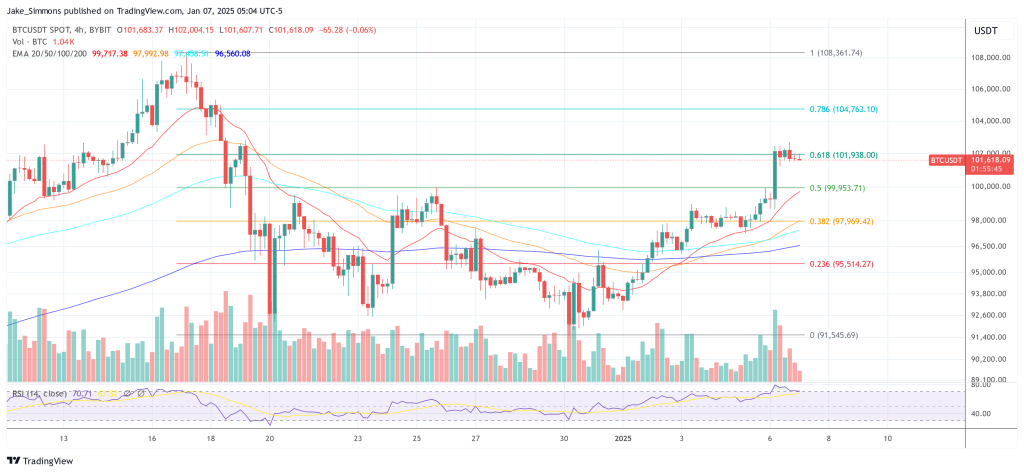- Home
- Features
- Business
- Active
- Sports
- Shop
Top Insights
Strategic Bitcoin Reserve Process Begins In 14 US States This Month, Says Insider

Dennis Porter, co-founder and chairman of the 501(c)(4) non-profit Satoshi Action Fund, has revealed a significant development in US state-level Bitcoin initiatives. On December 7, via X, he declared, “A 14th state is now poised to introduce ‘Strategic Bitcoin Reserve’ legislation.”
Previously, Porter had disclosed that he was working with 13 different states on proposals to establish a Strategic Bitcoin Reserve (SBR). Notably, Porter was instrumental in helping several states pass pro-Bitcoin laws in the past, and his ongoing lobbying efforts center on establishing SBR’s in several US states.
When Will US States Establish A Bitcoin Reserve?
Porter explained that many people have asked him, “when will the process start for ‘Strategic Bitcoin Reserve’ legislation at the state level,” prompting him to outline a detailed roadmap that he expects most states to follow. According to him, a proposed bill can either originate in a state’s House or Senate; once it is officially introduced, it must pass an initial hearing before a relatively small group of lawmakers who determine whether it should move forward.
A simple majority is typically needed in that hearing for the bill to advance to a floor vote in the same legislative chamber. If it obtains a simple majority in that floor vote, it proceeds to the second chamber, where lawmakers again hold a hearing followed by a chamber-wide floor vote.
Should the bill pass in the second chamber, it is then sent to the Governor’s desk for signature or veto. Porter stressed that “If the Governor signs the bill, then the legislation is law:” He added: “It’s filled with potential land mines that could kill a bill at any moment,” emphasizing the fragility of the process and the importance of continuous advocacy efforts.
Porter shared that timelines for legislative action in most states will begin this month, explaining that “In most states this process starts this month. Additionally, in most states, the legislative cycle ends quickly. Most states are part-time legislatures. So a lot of this activity will take place very quickly over the next six months.”
With part-time legislatures, state lawmakers convene for relatively short sessions, often just a few months in length. This compressed schedule means that any proposal on the table faces a concentrated period of discussion, negotiation, and votes, offering limited windows for success or failure.
Porter called these deadlines a “forcing mechanism for action,” stating, “The benefit of working at the state level is there are fast and hard deadlines. A bill either sinks or swims very quickly.” He said that, by summer, many states will have either adopted a strategic Bitcoin reserve or not, given the short and decisive nature of the legislative cycle in those particular jurisdictions.
However, Porter also noted that not all states operate under the same time constraints. Some, such as Ohio and Pennsylvania, have year-round legislatures, meaning there is more time to advance legislative measures or amend proposals. While more flexible, these extended cycles can delay the final outcome.
Porter indicated that the multi-state effort intentionally accounts for these variations by working simultaneously on identical or near-identical bills, with each state legislature proceeding at its own pace. This approach, he suggested, “dramatically increases the odds that we will get critical legislation like Strategic Bitcoin Reserve across the finish line,” since the success of one bill can build momentum or offer lessons for others.
At press time, BTC traded at $101,618.

Recent Posts
Categories
Related Articles
Crypto Market Trends: What to Expect in February 2025
The cryptocurrency market started 2025 with a surge, reaching a $3.76 trillion...
ByglobalreutersFebruary 12, 2025BitLemons emerges as a strong contender, competing with PEPE, AI16Z
BitLemons gains attention with $1m in seed funding and plans to disrupt...
ByglobalreutersFebruary 12, 2025Bitcoin OTC Balances Decline, Raising Market Supply Questions
Bitcoin has experienced a challenging period recently, with its price consistently declining...
ByglobalreutersFebruary 12, 2025Bitcoin Price Dumps to 9-Day Low on Higher-Than-Expected US CPI Data
BTC slipped below $95,000 immediately after the news broke.
ByglobalreutersFebruary 12, 2025





Leave a comment